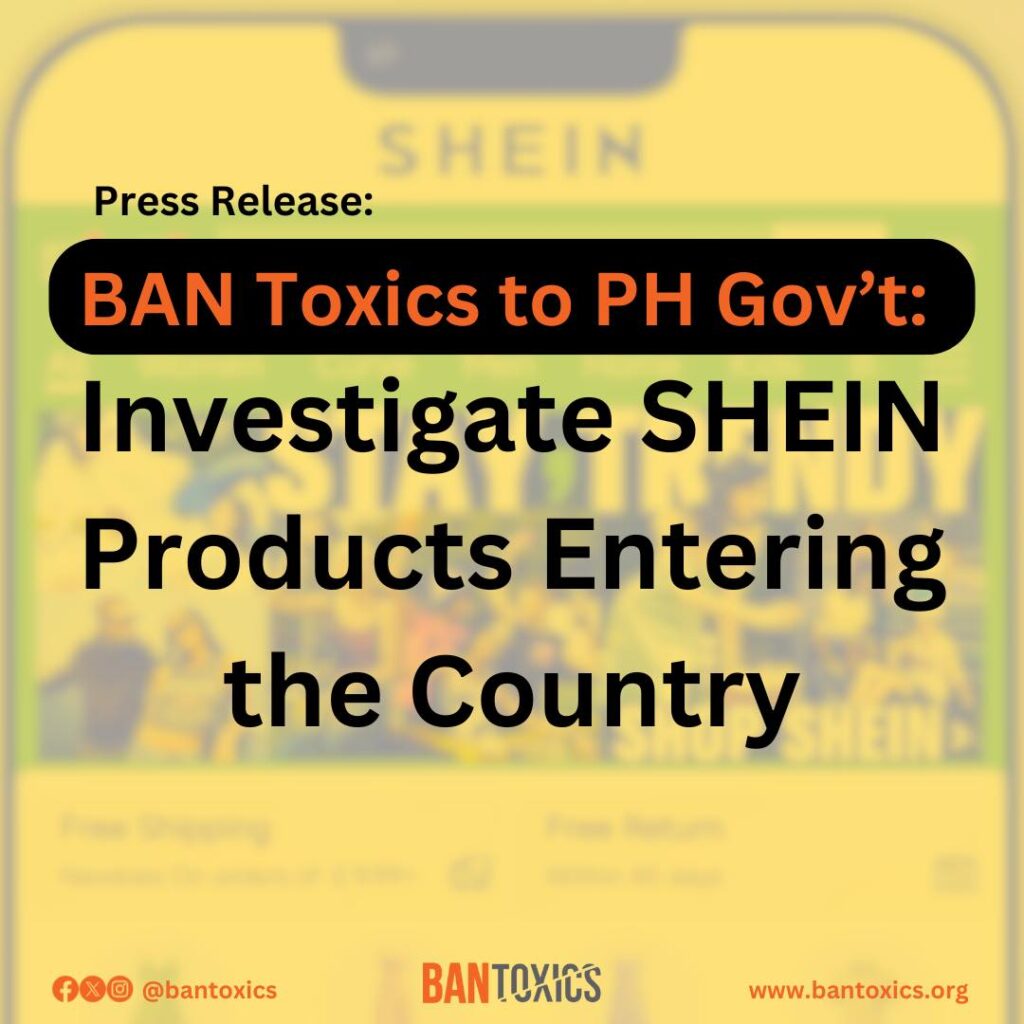PRESS RELEASE | May 30, 2024

Following recent findings by the Seoul City government revealing that children’s products sold by the online shopping platform SHEIN contain high levels of toxic chemicals, Environmental NGO BAN Toxics is calling on the Philippine government to conduct its own investigation.
According to news reports, the Seoul government has been conducting safety inspections since last month following growing safety concerns about products sold by Chinese e-commerce platforms. The latest information revealed that seven out of eight tested products from SHEIN contained formaldehyde and phthalates exceeding safety limits. One pair of children’s shoes contained phthalates exceeding the permitted limit by 428 times.
Phthalates, commonly used as plasticizers, belong to a group of endocrine-disrupting chemicals. Exposure to high amounts of phthalates is detrimental to the reproductive, neurological, and developmental systems of humans, with children being even more vulnerable.
Use of phthalates in children’s toys is prohibited under the Food and Drug Administration’s Administrative Order No. 2009-0005-A. However, there is no order yet for apparel items such as clothing, bags, and shoes.
Meanwhile, absorption of large amounts of formaldehyde through any means can result in severe systemic toxicity, leading to metabolic acidosis, tissue and organ damage, and coma.
“We find this very alarming since SHEIN is one of the biggest online e-commerce platforms popular in our country, especially among the youth. Our own regulatory agencies should also make an effort to immediately conduct safety tests of products sold on SHEIN, otherwise, we could be inadvertently exposing our people to highly dangerous chemicals,” says Thony Dizon, BAN Toxics Campaign and Advocacy Officer.
SHEIN is arguably one of the biggest online fashion stores globally, known for its low prices and trendiness. A Time magazine article in 2023 even dubbed it as the world’s most popular fashion brand.
Online sales in the Philippines are regulated by the Department of Trade and Industry through various laws, including RA 7394 (Consumer Act of the Philippines), RA 8293 (Intellectual Property Code), and RA 10372 (An Act Amending Certain Provisions of RA 8293). More recently, a joint administrative order (JAO 22-01) issued by different government agencies has outlined guidelines, laws, and regulations relevant to online businesses and consumers. Sections 6 and 7 of JAO 22-01 emphasize the responsibility of online businesses to protect the public against health and safety hazards.
However, Dizon says enforcement of these regulatory policies remains a challenge for the government.
“Customs and regulatory authorities face challenges in regulating online trade, especially in monitoring the higher volumes of small parcels traded through international couriers. All online purchases are supposed to undergo thorough inspection. Government regulatory systems are vulnerable to misdeclaration, including the use of false information and misclassification regarding the description of goods,” Dizon added.
“BAN Toxics calls on the government to improve our regulatory agencies’ capacity for market surveillance, enforcement, product inspection and analysis, as well as detection capabilities, to effectively curb the widespread trade of products containing toxic chemicals.”
References:
SHEIN Online Platform:
https://www.koreatimes.co.kr/www/nation/2024/05/113_375473.html
